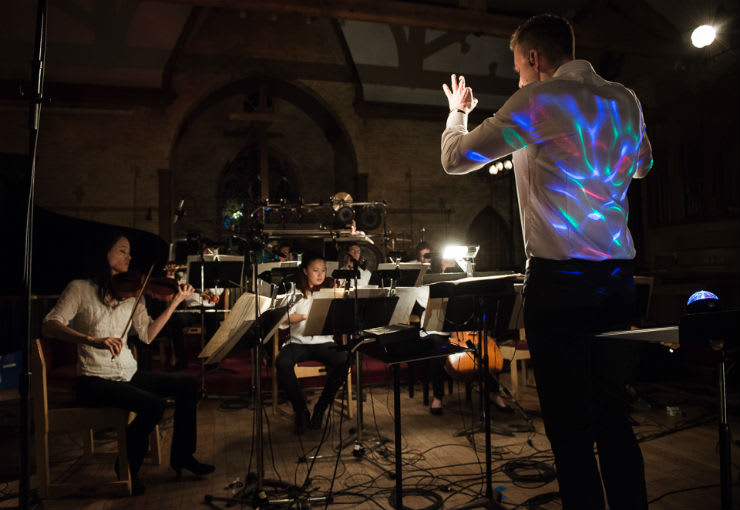When Fausto Romitelli composed Professor Bad Trip, his sonic phantasmagoria cycle in three sections (or "lessons," as he identified them), he was immersed in a musical world obsessed with spectralism, and enamoured with the likes of underground punk comic artist and drug enthusiast Gianluca Lerici, existential poet Henri Michaux and Francis Bacon (the structure alludes to the painter's experimental masterpiece "Three Studies for a Self-portrait"). It's a work that calls for chaotic orchestra and carefully orchestrated chaos. When done properly, the result is a fully involved, dark, psychedelic chamber music spectacle that spills out from all directions — a claustrophobic, hair-raising listening experience that is at once as engrossing as it is consuming.
At the age of 41, Romitelli lost a long fight with cancer in 2004, and while he's recognized as a cult leader of modern new music, North America has taken some time to recognize his influence. But consciousness is slowly growing with recent performances of the late composer's work. Contact Contemporary Music gave one such presentation last night at the Music Gallery, delivering the Toronto debut of Romitelli's Professor Bad Trip cycle. Performing as an 11-piece ensemble to a packed hall, the group gave a performance that will surely live on in flashbacks and local sound experiments yet to come.
Percussionist Dean Pomeroy and pianist Stephanie Chua were particular delights to watch as they tended to their various tasks, switching from water gongs to tubular bells to drums, and from piano to keyboard to kazoo, respectively. Cellist Rebecca Morton, meanwhile, handled a particularly complicated solo in Lesson II that was all over-the-neck technique — surely exhausting, and also instructive of the maximalist instrumentation and physical endurance Romitelli demanded in his work.
As the cycle progressed, the more traditional orchestral instruments were overwhelmed by detonations of heavily distorted electric guitar, an EBowed electric bass and other synthetic effects, a commentary on a modern anxiety that seems perhaps more pertinent than it was when it was originally prescribed in its druggy context 15 years ago.
If that wasn't intoxicating enough (and it was), Music Gallery lighting director Sandor Ajzenstat was hard at work transforming the church sanctuary the Music Gallery borrows its space from through use of practical and digital projections. As the night went on, he blasted the walls with coloured oils dripping on a glass plate; clouds of floating, bursting and blossoming multi-coloured digital confetti; and galaxies of zigzagging lines and swelling kaleidoscope tunnels. Making him look even more like the wizard tending to a serious enchantment he already was, an orb spun throughout the three lessons, lighting up the back of conductor Eric Paetkau's white shirt with dancing reds, greens, and blues.
Despite all the overwhelming winding roads of surreal, impressionist delirium it took everyone down, Contact's performance of Professor Bad Trip was a hypnotically effective spectacle of order and chaos (mostly chaos) that highlighted and revelled in the natural, amplifiable flexibility of the mind, body and spirit.
At the age of 41, Romitelli lost a long fight with cancer in 2004, and while he's recognized as a cult leader of modern new music, North America has taken some time to recognize his influence. But consciousness is slowly growing with recent performances of the late composer's work. Contact Contemporary Music gave one such presentation last night at the Music Gallery, delivering the Toronto debut of Romitelli's Professor Bad Trip cycle. Performing as an 11-piece ensemble to a packed hall, the group gave a performance that will surely live on in flashbacks and local sound experiments yet to come.
Percussionist Dean Pomeroy and pianist Stephanie Chua were particular delights to watch as they tended to their various tasks, switching from water gongs to tubular bells to drums, and from piano to keyboard to kazoo, respectively. Cellist Rebecca Morton, meanwhile, handled a particularly complicated solo in Lesson II that was all over-the-neck technique — surely exhausting, and also instructive of the maximalist instrumentation and physical endurance Romitelli demanded in his work.
As the cycle progressed, the more traditional orchestral instruments were overwhelmed by detonations of heavily distorted electric guitar, an EBowed electric bass and other synthetic effects, a commentary on a modern anxiety that seems perhaps more pertinent than it was when it was originally prescribed in its druggy context 15 years ago.
If that wasn't intoxicating enough (and it was), Music Gallery lighting director Sandor Ajzenstat was hard at work transforming the church sanctuary the Music Gallery borrows its space from through use of practical and digital projections. As the night went on, he blasted the walls with coloured oils dripping on a glass plate; clouds of floating, bursting and blossoming multi-coloured digital confetti; and galaxies of zigzagging lines and swelling kaleidoscope tunnels. Making him look even more like the wizard tending to a serious enchantment he already was, an orb spun throughout the three lessons, lighting up the back of conductor Eric Paetkau's white shirt with dancing reds, greens, and blues.
Despite all the overwhelming winding roads of surreal, impressionist delirium it took everyone down, Contact's performance of Professor Bad Trip was a hypnotically effective spectacle of order and chaos (mostly chaos) that highlighted and revelled in the natural, amplifiable flexibility of the mind, body and spirit.
